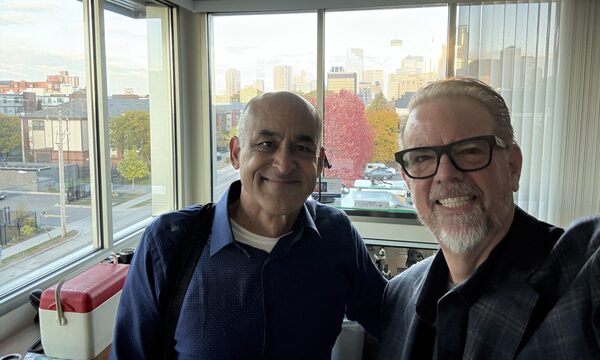Recently I partnered with my friend Eric Johnson to co-edit the book Sharing the Good News with Mormons. He lives in Salt Lake City, Utah, and works with the Mormonism Research Ministry. The book contains over two dozen practical strategies for engaging Mormons in spiritual conversation.
Eric briefly answered a few of my questions about recent changes within the LDS Church, reasons Mormons leave their faith, and mistakes Christians often make in their outreach to Mormons. Enjoy!
SEAN MCDOWELL: Do you believe the LDS church has moved in a more biblical direction in recent years? Why or why not?
ERIC JOHNSON: There are some Christians out there who claim that the current LDS leaders are misunderstood and insist these men are guiding their religion toward biblical Christianity. As someone who listens to every General Conference talk given twice a year by the main leaders, and as someone who reads their church manuals and magazines that are supposed to be read by the membership, I can say this is not true. What is true is that the leaders are more likely to use Christian terms, such as salvation and grace, that are understood by Christians. However, the meanings given to these words are as different as the night is from the day.
MCDOWELL: Why should Christians care about reaching their Mormon friends and family with the gospel?
JOHNSON: I guess the answer can be found by asking another question: "Why should Christian care about sharing the true Gospel message with anyone?" Please don't misunderstand what I'm saying. Mormons are wonderful people and make great neighbors. But since being "good" is not what God requires for people to be forgiven of their sins, then Mormons are just as in much need of the biblical Gospel as the animistic natives in New Guinea, the Muslims in Africa, or the Buddhists in Sri Lanka. Unfortunately, many Christians don't want to "rock the boat," but if people are headed toward an eternity of separation from God, shouldn't we care?
MCDOWELL: What are the main reasons Mormons leave the LDS Church and become Christians? What are the key barriers?
JOHNSON: Many leave Mormonism when they learn the problematic history of the church or discover that Mormon doctrine is not taught in the Bible. We must understand that most who leave their faith naturally gravitate toward atheism or, at best, agnosticism. I have heard statistics saying this number is as high as 80%! Thus, our goal is not just to get a person out of Mormonism just so they can now have no hope at all—that's out of the fat and into the fire, as they say.
Mormons have been told since they were little children, "If Mormonism isn't true, then nothing else is." As one friend of mine says, Mormonism is the perfect breeding ground for skepticism. Our goal, then, is to help a person leaving Mormonism understand that the Bible is true and there really is a God who loves people, even if a religion like Mormonism—a man-made religion—has misled them. We have found that most people who leave Mormonism for Christianity had at least one Christian friend who held their hand along the way and assisted them by being there in time of need as well as inviting them to church and sharing the Good News in a clear and understandable manner.
MCDOWELL: What common mistakes do you see Christians make in their interactions with Mormons?
JOHNSON: They are not patient and are tempted to quit trying or praying for them anymore. It is too easy to want to literally shake our Mormon friend and scream, "Why can't you see the problems in Mormonism?" Let me encourage you with one story. I have a friend, a former Mormon missionary I'll call "Sam," whose large family has remained staunch Mormons even after Sam left "the Church" a decade ago for Christianity. The family's history in Mormonism goes back to the 19th century. But, in the last two months, a brother and sister separately have left Mormonism and are attending Christian churches in different states. When this brother, a lawyer, told someone in his office how "nuts" Sam was for being a Christian, his Christian friend asked, "But what if your brother is right?" This caused Sam's brother to begin researching, as he discovered some of the holes in the religion he never knew about. Now he was ready for the Gospel and was willing to attend his friend's church. Incredibly, Sam gets to go to his brother's Christian baptism at that church in May. Trust me, Sam is walking on Cloud 9! And he is praying even more earnestly for the rest of his family, as this event has caused quite a stir.
MCDOWELL: How do you motivate Mormons to consider the gospel when they already understand themselves to be followers of Jesus?
JOHNSON: Mormons are fond of saying that they are "Christians" too. So I recommend asking questions. Lots of questions. Don't tell the Mormon what they believe but let them tell you what they believe. Several chapters in our book use this formula to help direct a conversation to important issues. For instance, if the Mormon says that she is saved by God's grace, ask, "What does grace mean to you?" In Mormonism, grace is just an "enabling power" (they'll use those exact words). Then respond, "So is God's grace enough for you to receive the very best eternal destination possible?" The answer is no, that obedience to God's commandments are needed, contrary to the New Testament Gospel. Thus, Mormons must admit that because they fall short of God's intended best, there's no way to know—today or tomorrow—if they are forgiven of all their sins. A Christian is someone who knows their sins are completely forgiven (1 John 5:13) because justification comes through faith alone.
MCDOWELL: What was your motivation to co-edit our new book Sharing the Good News with Mormons? What makes this book unique?
JOHNSON: If I had a nickel for every time I was asked, "What's the one question / strategy / method, etc. for helping my Mormon friend / neighbor / relative become a Christian," I'd be retired and sailing on a yacht! I was asked such a question in late 2016 and, for the first time, I answered, "Well, there's not just one magic bullet, but I wish someone would write a book with the many successful strategies that are out there." That night I woke up in the middle of the night, realizing that such a book needed to be written. But it needed to be written by more than just one person. I am fortunate that I have many friends who use different tactics to share the Truth with Mormons.
I myself have several favorite ways that I like to use, but my ways might not resonate with every evangelist. Thus, the strength of this book is found in 24 different strategies written by 26 authors. Sean, I also want to acknowledge my appreciation for our partnership in this project. And I am impressed with the folks at Harvest House who believed in us and this project from the very beginning. I invite the reader to see more at our website.
You can find the original version of this article on Sean McDowell's blog.
 Biola University
Biola University



